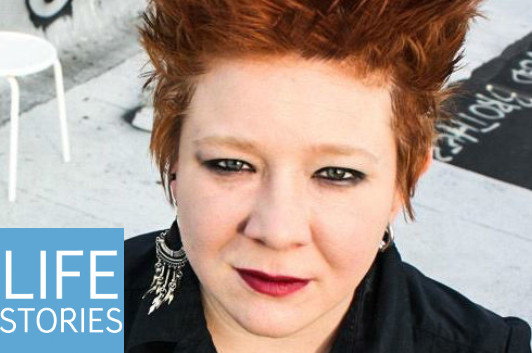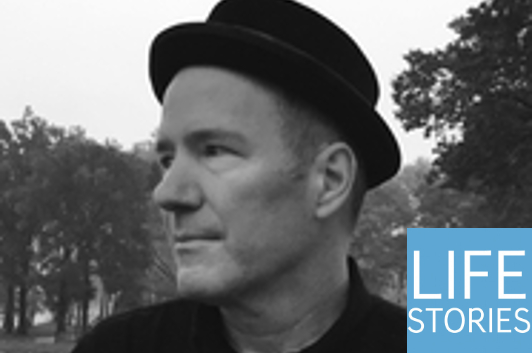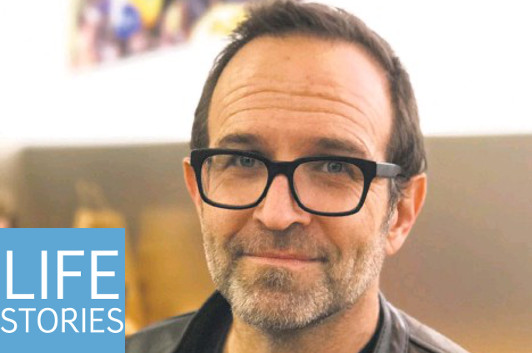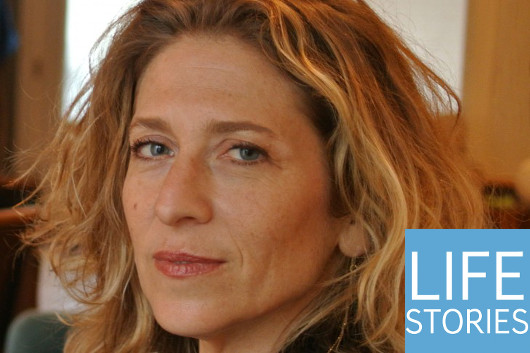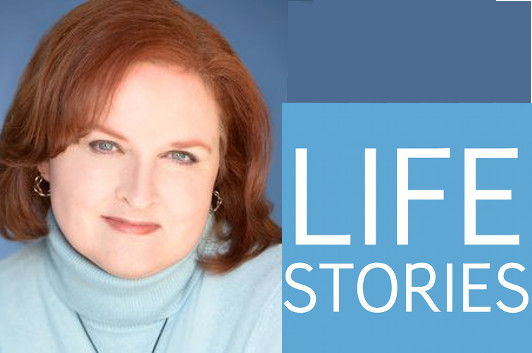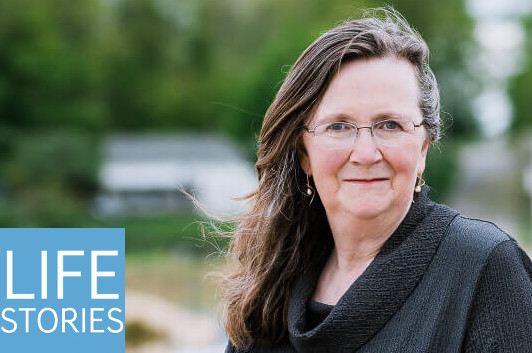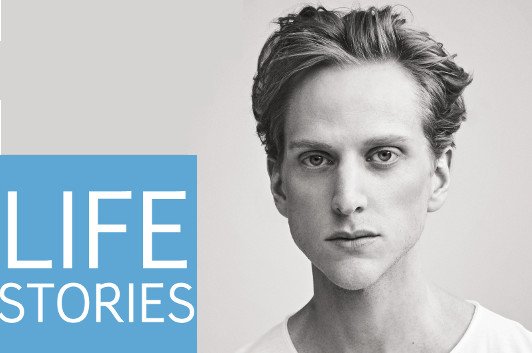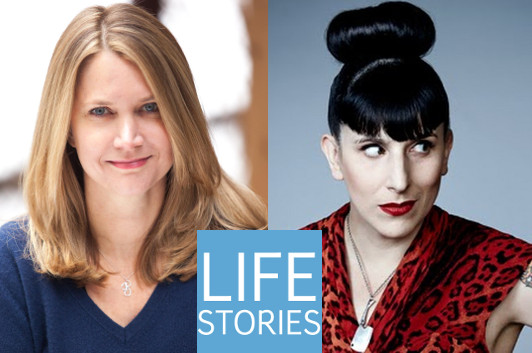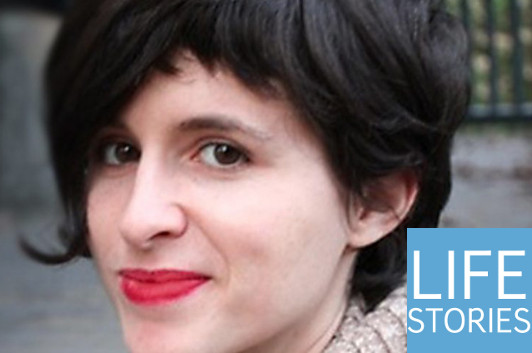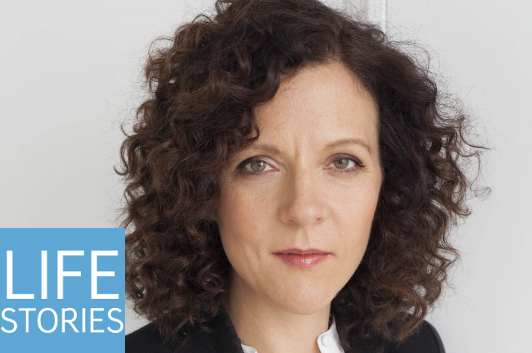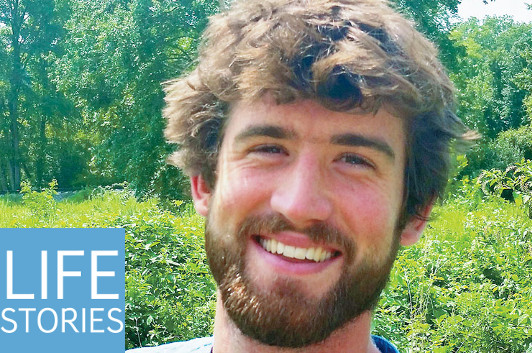
- Life Stories #107: Chavisa Woods
Chavisa Woods’ 100 Times: A Memoir of Sexism is a book that, as our British friends say, does exactly what it says on the tin—chronicling 100 separate incidents of sexist behavior that Woods has faced in her lifetime, a pattern of verbal, emotional, and physical abuse (including sexual assault) that starts when she’s five years old and continues to the present day. It’s a patten that, I speculated, just about any woman should find instantly recognizable, to which Woods replied:
“I keep saying a lot of memoirs are written because the author thinks it’s an exceptional story. I actually felt like I needed to write this memoir because my story is not exceptional at all, and I wanted to show how pervasive sexism is in multiple spheres of society… I just wanted to show how pervasive it is everywhere and how it affects us constantly throughout our lives.”
We cover a lot of territory in this conversation, including how Woods used to adopt a violent response to sexual harassment—and the mental and emotional toll that response took. Misogyny becomes like a hazing ritual, an ordeal women are supposed to endure for the privilege of being allowed to participate in society at all. As I said, every woman reading 100 Times will find it instantly familiar… but every man who reads it and doesn’t recognize the world it describes has to come to a hard reckoning with things he may have done and has almost certainly condoned through inattention, inaction, and silence.
Listen to Life Stories #107: Chavisa Woods (MP3 file); or download this file by right-clicking (Mac users, option-click). Or subscribe to Life Stories in Apple Podcasts, where you can catch up with earlier episodes and be alerted whenever a new one is released. (If you’re already an iTunes subscriber, please consider rating and reviewing the podcast!)
photo: Itziar Barrio
5 August 2019, 4:41 am - Life Stories #106: Rick Moody
In The Long Accomplishment, Rick Moody takes readers through the first year of his second marriage. It was a moment in time where he’d gained significant control over his addictions, and had extricated from a dysfunctional first marriage—a moment when, as I jokingly said during our conversation, “everything should be coming up Rick Moody.” But it didn’t go that way; instead, we have an account of a couple grappling with the financial and emotional tolls of fertility treatment, along with various other assaults from the outside world… and, as Moody describes it, a shutdown of his creative faculties so all-encompassing that, eventually, the only thing he could see himself writing about was what was happening to the two of them.
We talked about how he was able to write about these events, and he made an insightful distinction between craft and candor—whereas most of his career, including his first memoir, he’d been focused on craft, this time around he decided to go all in on the opposite direction, to be as upfront as he could about everything:
“It would be most honest to say I’m a somewhat uncomfortable memoirist. The Black Veil was the hardest book I’ve ever written; it was very, very difficult to write. This one was easier than that one because I had fewer formalist balls in the air, but it wasn’t easy, either. I sort of had to trick myself into doing it… I treat it diaristically in the first draft, and then I try to impose sense on it.'”
It wasn’t, he confides, an easy project—and we also discuss what it’s like to write about the life you share with another person, and about facing a situation where being one of the most acclaimed writers of your generation is absolutely no help.
Listen to Life Stories #106: Rick Moody (MP3 file); or download this file by right-clicking (Mac users, option-click). Or subscribe to Life Stories in Apple Podcasts, where you can catch up with earlier episodes and be alerted whenever a new one is released. (If you’re already an iTunes subscriber, please consider rating and reviewing the podcast!)
photo: Laurel Nakadate
5 August 2019, 3:23 am - 29 minutes 19 secondsLife Stories #105: Glen David Gold
I first met Glen David Gold when he was on a reading tour for his second novel, Sunnyside, which happened to be the name of the neighborhood where I lived at the time; that wasn’t the only reason we hit it off, but we did, and so I was excited when I found out he was publishing a memoir, I Will Be Complete. I spoke to him in the summer of 2018 about his family history, how he’d tried to deal with it by writing fiction in his twenties, and the path toward eventually finding the right literary structure through which to tell the story. One of the first things I mentioned is how perfectly it illustrated that famous Philip Larkin verse about what your parents do, which eventually brought us to a discussion of how some relationships simply can’t be fixed:
“I notice a lot of memoirs are—and it’s the thing that frustrated me about The Glass Castle, which is a brilliant book, which is really well-written—at the end, she forgives everybody. And, like, ‘Wait a minute! Hold on! Time out! I have a different opinion here…’
Not to castigate anybody, but there’s something… Traditional memoirs end ‘And my family are all monsters and now I’m all healed, because I’m holding this door against them…’ That’s one, and the other is ‘Ahhhh, they’re my family, so I forgive them, and welcome and embrace.’ I think there’s another way to go, which is ‘hold them accountable, and walk off alone.'”
We also talked about how working on I Will Be Complete has made Glen a more confident writer, and the newly honed skills he’s been able to take back to his fiction. Plus the story of how David Leavitt became his literary archnemesis, until he actually went to a David Leavitt reading…
Listen to Life Stories #105: Glen David Gold (MP3 file); or download this file by right-clicking (Mac users, option-click). Or subscribe to Life Stories in iTunes, where you can catch up with earlier episodes and be alerted whenever a new one is released. (If you’re already an iTunes subscriber, please consider rating and reviewing the podcast!)
photo: Sara Shay
19 December 2018, 7:04 am - Life Stories #104: Minna Zallman Proctor
I met with Minna Zallman Proctor a while back, shortly after the publication of Landslide, a collection of autobiographical essays that orbit around her relationship with her mother. One of the things we discussed was how circumspect she was in the portrayal of her own children, and that prompted me to say something about how we don’t really know the author of a memoir or an autobiographical essay, that the “I” we read is a controlled, calibrated literary invention. Proctor challenged that assumption:
“The book is, at best, a portrait of my brain, of the way I think of things. In that sense, it’s incredibly honest. I don’t think that you can write a book like this without a degree of intimacy, a degree of candor and vulnerability—a great degree of those things—and I think that the vulnerability that I express in my personal essay writing… and sometimes my book reviews, too, for that matter… is in that I am laying it all out. This is the way my brain works.
“When I wrote my first book [Do You Hear What I Hear?], about my father trying to become a priest, I don’t think I fully understood that, hadn’t fully comprehended that. So that book is a very strange patchwork, in a way… part memoir, part philosophy, part research about the Episcopal Church, and lots of portraiture and interview work. All of those things kind of fit together, and they kind of don’t.
“And I think what I realized when that book came out and reviews started coming in was that when people criticized the organization of the book, what I felt was… Criticizing the book was criticizing the way I thought. And it felt much worse than if someone says, ‘You look fat in those pants.’ It was a whole different thing; it was like, ‘Your brain doesn’t organize things correctly,’ or, ‘Your brain organizes things in such a way that I can’t follow you.’
“So I was really aware of that with this book, and knew that what I was putting out there, what I felt vulnerable about, was that i was going to just let people see… I was going to try to explain to people how I think and how I feel… And in that sense, I think you really do know me from the book, because it’s constructed, but what it is is meant to be an expression of that part of my brain.”
Listen to Life Stories #104: Minna Zallman Proctor (MP3 file); or download this file by right-clicking (Mac users, option-click). Or subscribe to Life Stories in iTunes, where you can catch up with earlier episodes and be alerted whenever a new one is released. (If you’re already an iTunes subscriber, please consider rating and reviewing the podcast!)
photo: Sandra Dawn
27 July 2018, 3:51 am - Life Stories #103: Michelle Stevens
I first met Michelle Stevens in 2014, back when I was an acquiring editor for a startup book publishing company. We took a meeting with her and her agent after reading the proposal for her book, which combined a memoir about surviving childhood sexual abuse with solid explanations of the psychology involved in the dissociative identity disorder that Stevens, among others, developed as a result of that protracted trauma. I was impressed by the proposal, and the meeting, but I wasn’t the one who got to make those sorts of decisions, so we ended up passing on the book—fortunately, Scared Selfless wound up with a great publisher who was able to support the book in a way it deserved, so chances are that, sometime in 2017, you might have seen her in a magazine you were reading, or on a daytime talk show…
Happily, she and I were able to keep in touch, so when she came to New York City to do some media, we were able to get together for a frank conversation about—among other things—what dissociative identity disorder is (and what it isn’t), about how surviving her trauma motivated her career in psychotherapy, and about what it’s like to come forward with a story about surviving sexual abuse in a country where, let’s face it, the outcome of the most recent presidential election suggests our concern about sexual assault is not what it should be. I’m delighted to finally be able to share this conversation with you.
Listen to Life Stories #103: Michelle Stevens (MP3 file); or download this file by right-clicking (Mac users, option-click). Or subscribe to Life Stories in iTunes, where you can catch up with earlier episodes and be alerted whenever a new one is released. (If you’re already an iTunes subscriber, please consider rating and reviewing the podcast!)
photo courtesy Michelle Stevens
25 July 2018, 6:36 pm - Life Stories #102: Elizabeth W. Garber
I spoke with Elizabeth W. Garber the Monday right after Father’s Day, an apt time to be discussing her memoir, Implosion. It’s a story about growing up in Cincinnati in the 1960s and early ’70s in a glass house designed by her architect father—years that were so unsettling to live through that when Garber began speaking to her mother and her two brothers about the abuse they all endured, they initially refused to have anything to do with the topic. Which didn’t exactly surprise her, because it was the last thing she ever intended to write about, either:
“I’d been a poet for years and I wrote about living in Maine, and I wrote about being a mom… and I’d written almost nothing about my childhood. Every now and then, a little something would sort of squeak through, but I had no interest. I didn’t want to go back there, I didn’t want to really talk about or remember that part of my life.
“Then I had heart surgery, and afterwards, it was like this stream of memory that just started coming up, day after day. And I have a commitment, that when ideas or thoughts come up, that I write it. So I just started writing, and it started out with being a little girl in the village and living in an old Victorian house, and every day I wrote, for about an hour a day, for the next two or three years.
“I ended up writing just about every memory I had from my childhood into my twenties. I kept thinking, I don’t want to write about my dad, or all of this, but it just felt like that was what I had to do, so I just kept going. And then i started asking my mother and brothers for stories and details, and they were like, I don’t want to go there…”
During our conversation, Garber and I discussed how she had mentally and emotionally blocked out her father’s most invasive and abusive behavior while it was happening, and about how friends and neighbors, and even her father’s therapist, turned a blind eye to the blatant signs of his mental and emotional condition. We also discussed how her father’s most famous project became a landmark metaphor for all the shortcomings of modernist architecture… along with the more personal meaning it accrued within the family.
Listen to Life Stories #102: Elizabeth W. Garber (MP3 file); or download this file by right-clicking (Mac users, option-click). Or subscribe to Life Stories in iTunes, where you can catch up with earlier episodes and be alerted whenever a new one is released. (If you’re already an iTunes subscriber, please consider rating and reviewing the podcast!)
photo courtesy Elizabeth W. Garber
24 July 2018, 11:49 pm - 24 minutes 15 secondsLife Stories #101: David Hallberg
I met David Hallberg at the midtown offices of the American Ballet Theater, where they’d set aside a conference room for us to talk about his new memoir, A Body of Work. It’s about his relentless quest for perfection, from his earliest days as a ballet student in Arizona to his role as a principal dancer at ABT (and as the first American to hold a position of comparative stature at the Bolshoi’s dance company). But it’s also about realizing that, even though he thought he was pushing himself to the limit, he was really holding himself back—and about how a career-threatening injury drove him not just into physical therapy but into a complete overhaul of his emotional approach to his craft.
As I was reading A Body of Work, I started thinking Jim Bouton’s classic baseball memoir, Ball Four. Both books are by young men who’ve dedicated themselves to their field but find themselves coming face-to-face with the prospect of no longer being able to do the thing they love, far sooner than they’d ever anticipated. Fortunately, Hallberg was able to make the comeback, and as this episode goes online he’s approaching the first anniversary of his return to the stage.
Listen to Life Stories #101: David Hallberg (MP3 file); or download this file by right-clicking (Mac users, option-click). Or subscribe to Life Stories in iTunes, where you can catch up with earlier episodes and be alerted whenever a new one is released. (If you’re already an iTunes subscriber, please consider rating and reviewing the podcast!)
photo: Bjorn Iooss
18 December 2017, 6:25 am - 46 minutes 40 secondsLife Stories #100: Kat Kinsman & Andrea Petersen
For the 100th episode of Life Stories, the podcast where I’ve been talking to memoir writers about their lives and the art of writing memoir, I wanted to do something special. So, in the spring of 2017, I sat down with Kat Kinsman, the author of Hi, Anxiety: Life with a Bad Case of Nerves, and Andrea Petersen, the author of On Edge: A Journey Through Anxiety, for a wide-ranging discussion about their personal experiences with anxiety disorder, about maintaining their mental health while dealing with the pressures of their careers in the media industry—like, what does and doesn’t work for them, and why it might or might not work for someone else suffering from anxiety—and about the battle that was then raging to protect our government health care programs. (A battle that we’ll undoubtedly have to fight again before too long.)
Sometimes it’s hard to believe that it’s been nearly six years since I uploaded my first Life Stories interview, and I’m grateful for the opportunity to have talked to so many fascinating people about their experiences, and about how they’ve striven to communicate their experiences to others. There’s several more interviews already in the pipeline, and while the schedule has been somewhat erratic at times, I’m hoping to establish a steady rhythm in 2018. I hope you’ll continue to join me for those conversations!
Listen to Life Stories #100: Kat Kinsman & Andrea Petersen (MP3 file); or download this file by right-clicking (Mac users, option-click). Or subscribe to Life Stories in iTunes, where you can catch up with earlier episodes and be alerted whenever a new one is released. (If you’re already an iTunes subscriber, please consider rating and reviewing the podcast!)
photos: Marc Goldberg Photography, Jeremy Freeman/CNN
7 December 2017, 5:07 am - 41 minutes 57 secondsLife Stories #99: Lauren Marks
Lauren Marks was an actress in her late twenties when she went to Edinburgh in 2007 to direct a friend’s play in the city’s annual Fringe Festival. One night, they went out to a bar, and she was in the midst of a karaoke number when an aneurysm in her brain burst. When she regained consciousness, her ability to communicate with the people around her was massively impaired. A Stitch of Time is the story of her recovery from that aphasia—which was so severe at one point that she lacked a conscious interior voice.
There’s a lot of personal story packed into Lauren’s memoir, and into this conversation. We talk about her frustration at what felt like a parent’s attempt to co-opt her “story,” about her then-boyfriend’s attempt to essentially treat her brain injury as an opportunity to “reboot” their relationship, and about how the injury forced her to fast-track a re-evaluation of her life that had already begun. As she explains, “It’s not unusual for someone twenty-seven in New York to say, ‘This is not enough for me. Do I take a dramatic turn?'”
“I promise you, I did not want to write a memoir. That was not something that I would have wanted—I didn’t even like to read memoirs at the time. It is a weird choice to go from I’m struggling to conjugate a verb and to then think, yeah, I’ll be a writer, great idea! But also, what else could I do?
“I couldn’t do anything entirely independently anymore. I mean, lucky for me, my physical self is okay; I didn’t lose my ability to walk, I can still dress myself, things like that. But I couldn’t manage an independent life. The fact was decided, I was going to be at my parents’ house; I’d be with my parents, in my childhood home, for a while: decision made. I was not an actor, I couldn’t memorize any more, so: decision made. I couldn’t go through a textbook so: decision made, no longer Ph.D. student.
“As these things were off the table, so to speak, then it was much easier to say, well, I’m a writer because I’m writing. I don’t think that means I assumed this book would ever eventually come out to any kind of general audience. But writing is what made me able to write. The more I could write, the better I could write.”
And, as her writing improved, Lauren began to learn more about the neuroscience behind her condition, and that education makes its way into the memoir as well. And we discuss how she drew inspiration from the life stories of Helen Keller and… Casanova?
Listen to Life Stories #99: Lauren Marks (MP3 file); or download this file by right-clicking (Mac users, option-click). Or subscribe to Life Stories in iTunes, where you can catch up with earlier episodes and be alerted whenever a new one is released. (If you’re already an iTunes subscriber, please consider rating and reviewing the podcast!)
photo: Brooks Girsch
1 December 2017, 7:00 pm - 21 minutesLife Stories #98: Alexandria Marzano-Lesnevich
When Alexandria Marzano-Lesnevich was in law school, she did a summer internship at a Louisiana law firm. She was firmly against the death penalty, and then they asked if she would be prepared to work on the case of convicted child murderer Ricky Langley. Attempting to familiarize herself with the case, she was overwhelmed by memories of being molested by her grandfather—and though her career as a lawyer was pretty much over before it had even begun, her future as a writer was just beginning.
In The Fact of a Body, Marzano-Lesnevich writes about her efforts not just to confront what had happened to her and her sister, and how her family had suppressed it, but also to understand Rickey Langley—not to sympathize with him, as we discuss in this interview, but to understand what drove him to commit his crimes… and how his attempts to seek help before then had gone unanswered.
During our conversation, she also described one of the long-term effects of her grandfather’s molestation, how even as an adult her body would sometimes “freeze up” in a dissociative state—and how, since the writing of this memoir, that had stopped. It led us to discuss the clich&@33; about memoir writing, which is that it’s supposed to be cathartic, a notion she vigorously challenged:
“When I was working on this book, I can’t tell you how many people said to me, ‘Oh, you’re writing a memoir? That must be so therapeutic!’ And I would always want to bite back at them: ‘Not if you’re doing it right!’/p>
Right? If you’re doing it right, you’re dredging up all this stuff, and you have to go into the complexity of it that maybe you didn’t force yourself to think about in the past. And that is not really therapeutic; in fact, it’s often deeply disturbing and unsettling—and there were times working on this book when I just could not be around other humans.”
We also talked a lot about the true crime genre, from the reasons writers choose to write about certain crimes to the creative effort that goes into developing a narrative rooted in the bare facts of a case.
Listen to Life Stories #98: Alexandria Marzano-Lesnevich (MP3 file); or download this file by right-clicking (Mac users, option-click). Or subscribe to Life Stories in iTunes, where you can catch up with earlier episodes and be alerted whenever a new one is released. (If you’re already an iTunes subscriber, please consider rating and reviewing the podcast!)
photo: Nina Subin
21 November 2017, 6:31 pm - 26 minutes 44 secondsLife Stories #97: Andrew Forsthoefel
As I was talking with Andrew Forsthoefel in the spring of 2017 about his 4,000-mile walk across the United States, which he writes about in Walking to Listen, I asked a kidding-but-not-kidding question: “So, what were you walking away from?” Because you don’t set off on foot to talk to random strangers unless there’s something you don’t want to deal with at home—but, as Andrew explains, the journey actually forced him to confront everything he’d been dealing with since his parents’ divorce a few years earlier.
And while he did talk to people that he met along the way, I realized that for the vast majority of his journey, he was out there alone with his own thoughts; as I told him, he could just as easily have gone up to the top of a mountain to meditate, but instead he chose to put one foot in front of the other. He agreed:
“It was a long, drawn out, movement-based confrontation with myself, which is what happens in the caves, in solitude, on top of the mountain. It was a similar experience. And the punctuations that you mentioned of the people I got to meet along the way… the people had a way of enhancing all the inner exploration I was having.
So I would do all this inner exploration on the road alone, and then I would meet someone at the end of the day. And I would be able to ask them authentically, sincerely, a question I had about my own exploration, and their experience of it. If I had spent the day dealing with sadness, I might meet someone at the end of the day, and get to talk with them, and the conversation might lead toward sadness, and I could hear about how they navigated that kind of thing.
And I came to realize that each person was a unique wellspring of information, of experiential information. And I could lean into that [wellspring], and drink from it, and we could share in that together.”
Listening to this conversation again a few months later, I was struck by Andrew’s thoughtful determination to really listen to others—to meet them with the full force of his empathy, even when (as we discuss) what they’re telling him is rooted in prejudice and hate. In a political climate where pundits make a lot of noise about “listening” to “forgotten” Americans, Andrew’s story offers a model for genuine conversation.
Listen to Life Stories #97: Andrew Forsthoefel (MP3 file); or download this file by right-clicking (Mac users, option-click). Or subscribe to Life Stories in iTunes, where you can catch up with earlier episodes and be alerted whenever a new one is released. (If you’re already an iTunes subscriber, please consider rating and reviewing the podcast!)
photo: Luke Forsthoefel
20 November 2017, 5:11 pm - More Episodes? Get the App
